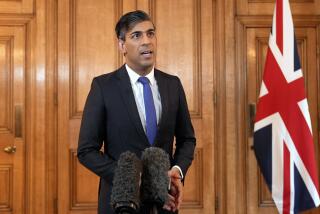U.S., Britain close embassies in Yemen over threats
- Share via
The United States and Britain closed their diplomatic outposts in Yemen today because of unspecified threats from Al Qaeda in the volatile Arabian Peninsula country.
A statement posted to the U.S. Embassy website cited “ongoing threats by Al Qaeda in the Arabian Peninsula to attack American interests in Yemen.” A report by the state-owned British Broadcasting Corp. cited an unnamed foreign ministry official in London as saying the embassy was closed for “security reasons.”
Both diplomatic missions normally stay open Saturday through Wednesday. At least 16 people died in a Sept. 17, 2008, car bomb attack against the U.S. embassy in San’a.
According to the Associated Press, President Obama’s top counterterrorism adviser, John Brennan, said the U.S. won’t “take any chances” with the lives of American diplomats and others at the embassy.
Brennan told “Fox News Sunday” that there will be an ongoing threat until Yemen’s government gets a better handle on terrorism. He said the U.S. isn’t opening a new front in Yemen against terrorism.
Brennan estimated that there are several hundred members of Al Qaeda in Yemen.
The group Al Qaeda in the Arabian Peninsula claimed responsibility for the attempted bombing of a Detroit-bound Northwest Airlines flight from Amsterdam on Christmas Day.
The alleged Nigerian attacker failed to set off explosives attached to his underwear. But claims that he was tutored in Yemen have set off alarm bells in Western capitals about the nation of 23 million, which is also facing an insurgency in the north and a separatist movement in the south.
U.S. Gen. David Petraeus visited Yemen last week and vowed to give the government of President Ali Abdullah Saleh increased aide to fight Al Qaeda. But today, Yemeni officials appeared to shirk any deal. Foreign Minister Abubakr Qirbi told a government run newspaper that his country welcomed intelligence-sharing, but had made no commitment to conducting anti-terrorism operations with the West.
“Yemen has its own short-term and long-term schemes to tackle terrorists anywhere in the republic that only call for intelligence and information coordination with other countries,” he told the daily newspaper, Politics.
Saleh, himself a member of a Shiite Muslim offshoot sect, has been accused for years of turning a blind eye to growing Sunni extremists who’ve begun enforcing Islamic dress codes and setting up religious schools. Qirbi, in the interview published today, emphasized Yemen’s “continuing rehabilitation of and advising misled terrorists,” a reference to its controversial program of reeducating convicted Islamic militants, allowing them to go free.
Today, Saleh’s national security chief, Ali Al-Anisi, said Al Qaeda’s presence in Yemen was “exaggerated,” according to an account of his comments reported by the official Saba News Agency.
“All what has been said about Al Qaeda in Yemen was exaggerated,” the agency cited him as saying.
He reportedly insisted that Yemen was not a safe haven for Al Qaeda and pointed to “preemptive operations against militants which thwarted planned attacks on vital domestic and foreign interests in the country.” He reportedly said that 60% of five dozen terrorist attacks in the country since 1992 failed.
Al Qaeda claimed responsibility for the September 2008 attack. In March 2003, two people were shot dead and dozens more are wounded as police clashed with demonstrators trying to storm the embassy. In March 2008, three mortars missed the embassy and crashed into a high school for girls nearby, killing a security guard.
Last January, gunmen in a car exchanged fire with police at a checkpoint near the embassy, hours after the embassy received threats of a possible attack by Al Qaeda. Nobody was injured.
As recently as July, security was upgraded in San’a after intelligence reports warned of attacks planned against the embassy.
Saleh has presided for decades over the Arab world’s poorest nation, a generally lawless and mountainous land which faces vast unemployment, high birth rates and a plummeting water supply. Rampant corruption and festering tribal disputes exacerbate the problems.
The Associated Press contributed to this report.
More to Read
Sign up for Essential California
The most important California stories and recommendations in your inbox every morning.
You may occasionally receive promotional content from the Los Angeles Times.












